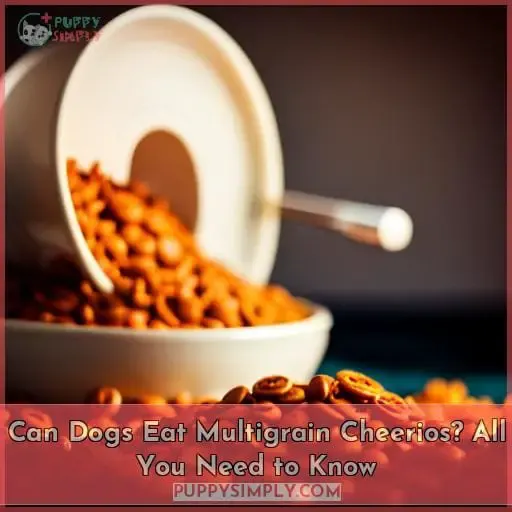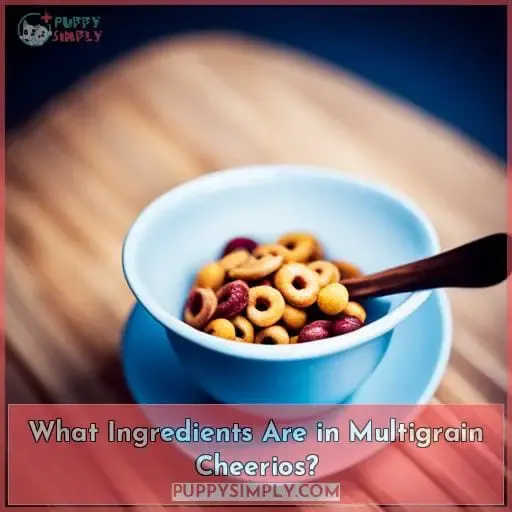This site is supported by our readers. We may earn a commission, at no cost to you, if you purchase through links.

The answer isn’t straightforward as there are many varieties available in the market and each one has its own ingredients.
So keep reading and learn everything about these crunchy snacks from AKC-recommended honey nut flavors, generic options with artificial sweeteners, flavored Cheerios safety tips, and more!
Table Of Contents
- Key Takeaways
- Can Dogs Eat Multigrain Cheerios?
- What Ingredients Are in Multigrain Cheerios?
- Are Flavored Cheerios Safe for Dogs?
- Can Dogs Have Honey Nut Cheerios?
- Are Generic Cheerios Suitable for Dogs?
- Why Should Dogs Avoid Cereals With Artificial Sweeteners?
- Can Dogs Eat Cheerios With Milk?
- Frequently Asked Questions (FAQs)
- Are there any health benefits to feeding multigrain Cheerios to dogs?
- What types of grains are included in generic Cheerios?
- How much Cheerios can a dog safely eat in a day?
- Are there any potential risks associated with feeding Cheerios to dogs?
- Are there any alternatives to Cheerios that are safe for dogs?
- Conclusion
Key Takeaways
- Multigrain Cheerios are safe for dogs in moderation, but avoid those with artificial sweeteners and harmful ingredients.
- Mixing cereals can prevent boredom in dogs’ diets.
- Puppy treats made with generic oat-based cereal can be considered for dog nutrition.
- Dogs should not consume cereals with milk due to potential adverse reactions.
Can Dogs Eat Multigrain Cheerios?
You can give your furry friend multigrain Cheerios in moderation, as long as they don’t contain artificial sweeteners like xylitol and other harmful ingredients. Multigrain Cheerios are free of preservatives and made with whole grain oats, corn bran, rice, sorghum millet-seed blend, brown sugar syrup, and coloring.
They can provide a nutritional boost for dogs that have allergies to certain grains while mixing cereals may help avoid boredom from eating the same food every day. Puppy treats made with generic oat-based cereal, such as those mimicking original Cheerios, should also be considered for dog nutrition, but make sure it doesn’t contain artificial sweeteners or additives before feeding them to your pet.
Dogs should avoid milk when eating their cereal due to lactose intolerance issues, so try adding some honey instead, which has beneficial immunity benefits without all the added sugars found in Honey Nut varieties of this popular brand name breakfast choice! Keep an eye on weight-related problems if giving high sugar content foods regularly since these could lead to obesity, diabetes, or dental issues down the road.
What Ingredients Are in Multigrain Cheerios?
Multigrain Cheerios are made from whole grain oats, corn bran, rice, sorghum, millet-seed blend, brown sugar syrup, and coloring. This cereal mix is a great option for dogs who have allergies to certain grains or need some variety in their diet.
However, it’s important to look out for the sugar content. Honey nut varieties may not be suitable if your pet has weight problems. Additionally, dairy should always be avoided as dogs can’t digest lactose effectively.
So, opt for dry treats instead of milk with cereal! To substitute treats, you could try generic oat-based cereals that mimic the original Cheerio shape but don’t contain artificial sweeteners like xylitol or any other harmful ingredients such as chocolate or caffeine found in some cereals.
It’s also possible to make puppy treats using plain Cheerios mixed with natural peanut butter and eggs or applesauce.
Are Flavored Cheerios Safe for Dogs?
Flavored Cheerios should generally be avoided as they may contain dangerous artificial sweeteners and other ingredients that can harm your pet. To keep your dog safe, look for cereals without allergens like dairy or nuts, no xylitol risks, and healthy snacks with simple grain ingredients instead of artificial ones.
A good rule of thumb when it comes to pet nutrition is to read labels carefully before giving anything new to your pup! Also, make sure you are getting cereal safety information from reliable sources so that you know what’s safe for them and what isn’t.
Options such as plain original Cheerios made from non-GMO whole grain oats or generic oat-based cereals mimic the original shape but don’t have any added sugar or unhealthy additives in them – perfect for a lower cost treat alternative! Even better yet, homemade treats using natural peanut butter mixed with eggs (or applesauce) and plain Cheerios can give variety while being nutritionally beneficial too.
Knowing all these tips will help ensure that you feed only the best snacks without worry about possible negative side effects due to adverse reactions caused by substances like chocolate found in certain types of flavored cereal products marketed specifically towards pets.
Can Dogs Have Honey Nut Cheerios?
Discover the answers to your questions about whether Honey Nut Cheerios are safe for your pup! This popular cereal contains more sugar than original Cheerios and should be avoided if you have a dog with weight problems.
However, it’s made up of whole grain oats, so its nutritional value can benefit dogs in moderation.
If you do decide to give them this treat, watch out for nut allergies or digestive issues as they contain almonds and other nuts that could cause adverse reactions in some pets. Be sure to check the honey content too, as excessive sugar intake can lead to diabetes and dental problems while also causing obesity over time.
Additionally, always read labels carefully before giving any product containing grains.
Are Generic Cheerios Suitable for Dogs?
Generic cereals that resemble Cheerios can offer your pup a low-cost treat, provided they contain only simple grain ingredients without artificial sweeteners. It’s important to read the labels carefully for xylitol content and sugar levels when selecting these breakfast cereals, as some may have higher amounts than plain Cheerios.
Dogs with dairy allergies should avoid milk products like cereal with milk along with other substances containing lactose which are difficult to digest for dogs.
For variety in treats, Honey Nut and Multigrain Cheerios can be given in moderation, but it is recommended that owners check the ingredients list and honey content before feeding them to their pets due to excessive sugar intake leading to weight problems or diabetes over time.
Natural peanut butter is also an excellent option when preparing homemade treats using whole grain oats or other grains such as cornflakes; however, it’s best not to give too many of these high-calorie foods if your dog has any health concerns related to weight management issues.
Why Should Dogs Avoid Cereals With Artificial Sweeteners?
It’s important to avoid cereals with artificial sweeteners, as these can be harmful for your pet and cause various health issues.
To ensure the best nutrition choices for your dog’s diet, it’s essential to read labels carefully before selecting any cereal products. Dogs shouldn’t eat anything that contains xylitol or other dangerous substances like caffeine or chocolate that could harm them if consumed in large quantities.
Generic Cheerios-like cereals may have additional ingredients that could affect a dog’s sensitivities. So, owners must always check the label beforehand when feeding their pets these treats.
Additionally, honey should only be given sparingly due to its high sugar content, which makes it unsuitable for dogs with weight problems or diabetes concerns. Since this type of cereal already has more sugar than plain Cheerios naturally, without added honey syrup flavoring agents being present too often over time, it could potentially lead to greater consequences down the road if precautions are not taken ahead of time appropriately by responsible pet owners looking out after their four-legged family members’ well-being in mind first and foremost overall.
Can Dogs Eat Cheerios With Milk?
You should not give your pet milk and Cheerios together due to the potential adverse reactions from dairy or artificial sweeteners found in flavored cereals. Dogs may be lactose intolerant, so it’s important to avoid feeding them products with any amount of milk.
Additionally, some dogs can have allergies or sensitivities to grains like corn which are present in many types of cereal including multigrain Cheerios. Artificial sweeteners such as xylitol can also cause severe health problems for pets.
Therefore, owners should always read labels carefully before giving their dog any type of food product containing these substances.
Low sugar options like plain original Cheerios made only with non-GMO whole grain oats, corn starch, and salt are a good choice if given sparingly. However, Honey Nut and Multigrain varieties contain more sugar than regular ones and could potentially lead to weight issues over time if consumed too often by overweight dogs.
Generic oat-based cereals that mimic Cheerios need careful scrutiny too because they can sometimes include additives that aren’t suitable for pets, such as chocolate flavoring agents or other ingredients known to be toxic when ingested by animals.
To ensure safety while providing variety, stick with simple grain breakfast cereals without artificial flavors whenever possible.
Frequently Asked Questions (FAQs)
Are there any health benefits to feeding multigrain Cheerios to dogs?
Yes, multigrain Cheerios offer many health benefits for dogs. They contain whole grains and no artificial sweeteners like xylitol, which can be harmful to pets. Plus, they’re low-cost compared to other treats and provide variety in a dog’s diet.
What types of grains are included in generic Cheerios?
Generic Cheerios typically contain grains like oats, corn bran, rice, sorghum, and millet. They may also have added sugar or sweeteners such as honey or brown sugar syrup.
How much Cheerios can a dog safely eat in a day?
It’s best to limit Cheerios consumption for dogs, as too much can cause digestive issues. Give your pet a few pieces at a time and monitor their behavior to ensure they’re not having any adverse reactions.
Stick with plain versions; flavored varieties contain potentially harmful ingredients like artificial sweeteners or chocolate that can be toxic to pets.
Are there any potential risks associated with feeding Cheerios to dogs?
Yes, there are potential risks associated with feeding Cheerios to dogs. Flavored Cheerios should be avoided due to artificial sweeteners and other potentially harmful ingredients. Dogs may also react adversely to substances like chocolate or caffeine in some cereals, so read the ingredient list carefully before giving them any cereal.
Are there any alternatives to Cheerios that are safe for dogs?
Yes, there are alternatives to Cheerios that are safe for dogs. Plain grain breakfast cereals such as Cornflakes or Chex types without artificial sweeteners like xylitol can be given in moderation. Honey may benefit your pup’s immunity and weight maintenance, but avoid high sugar content if they have a weight problem.
Read labels carefully before feeding any cereal and watch out for dairy products which dogs may not digest well.
Conclusion
In conclusion, Cheerios can be a safe and healthy treat for dogs. Plain original Cheerios are a great choice as they’re made of non-GMO whole grain oats, corn starch, pure cane sugar, and salt.
Multigrain Cheerios, Honey Nut Cheerios, and generic cereals mimicking Cheerios can also be given, but it’s important to read the ingredients carefully. Dogs should avoid cereals that contain artificial sweeteners like xylitol or substances like chocolate, coffee, or caffeine.
It is estimated that over 90% of dogs in the United States are overweight or obese, so it’s important to be mindful of the sugar content in the cereal as well. Feeding Cheerios to your dog can be an affordable way to treat your pup, just be sure to do it in moderation.













